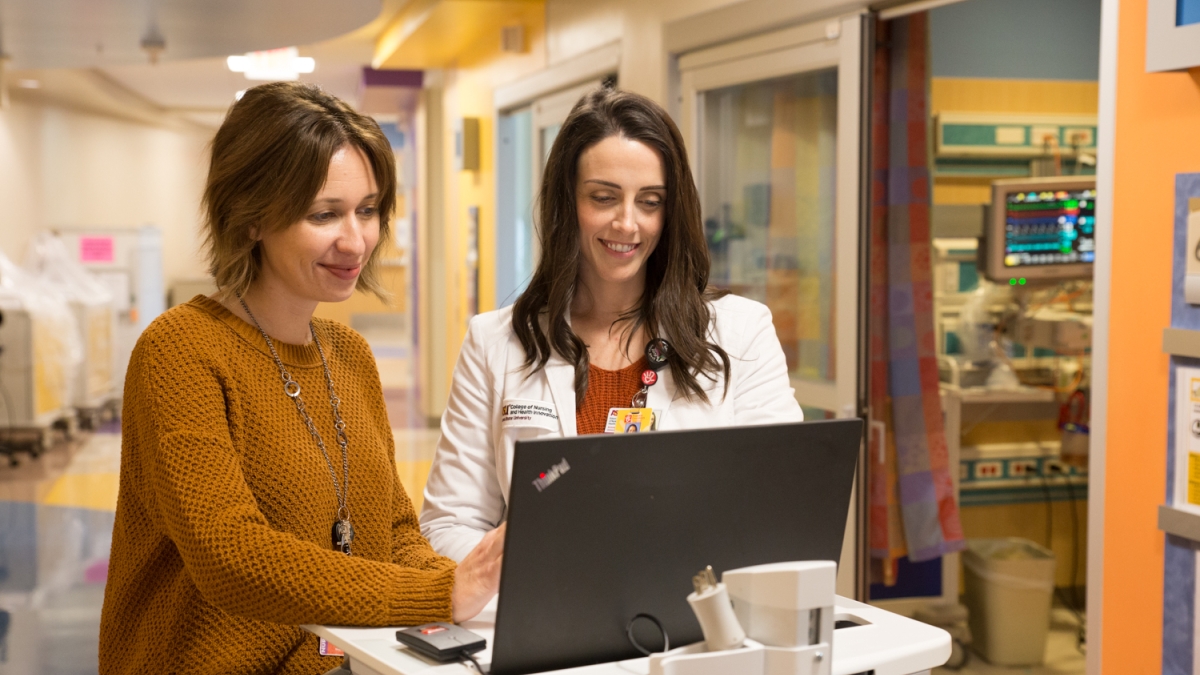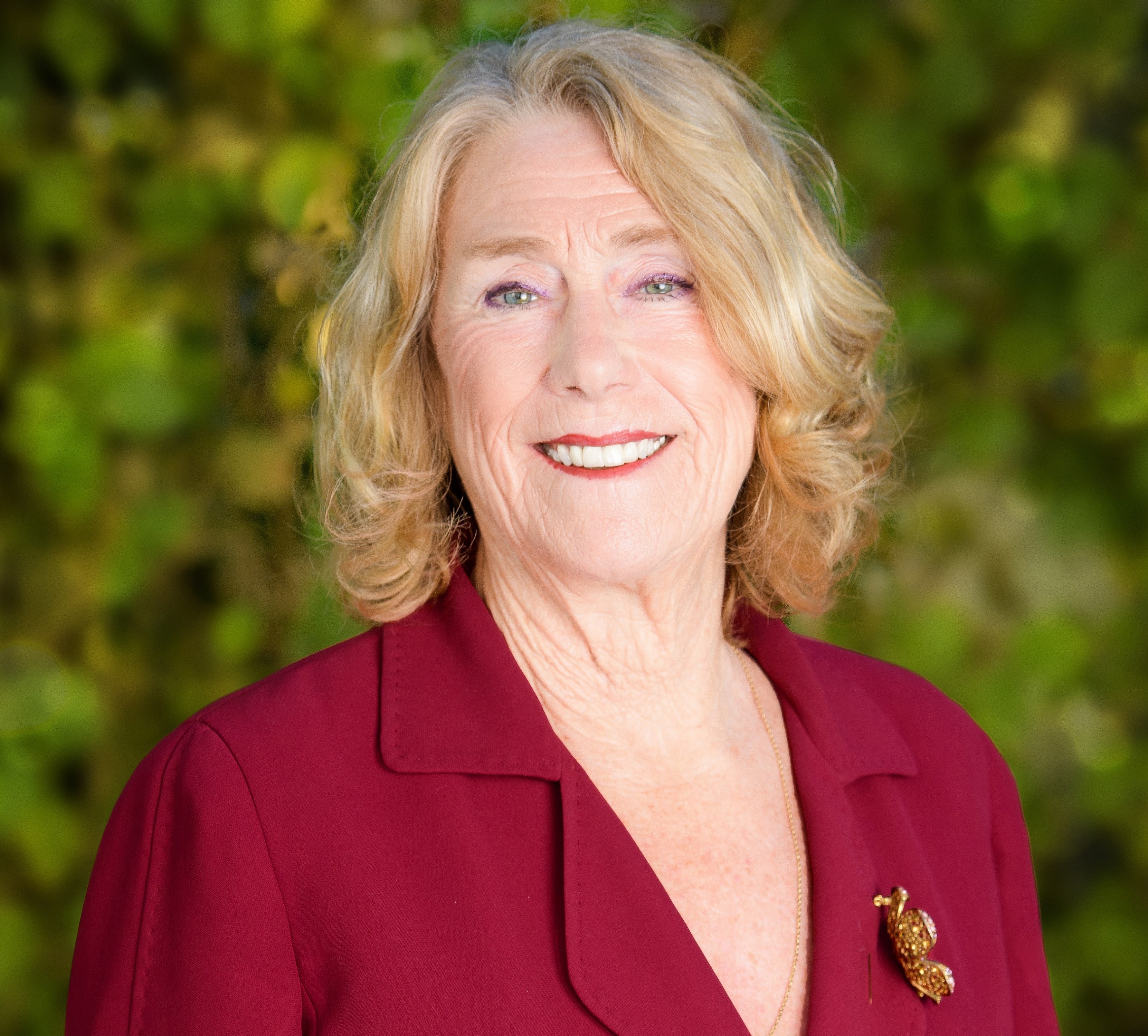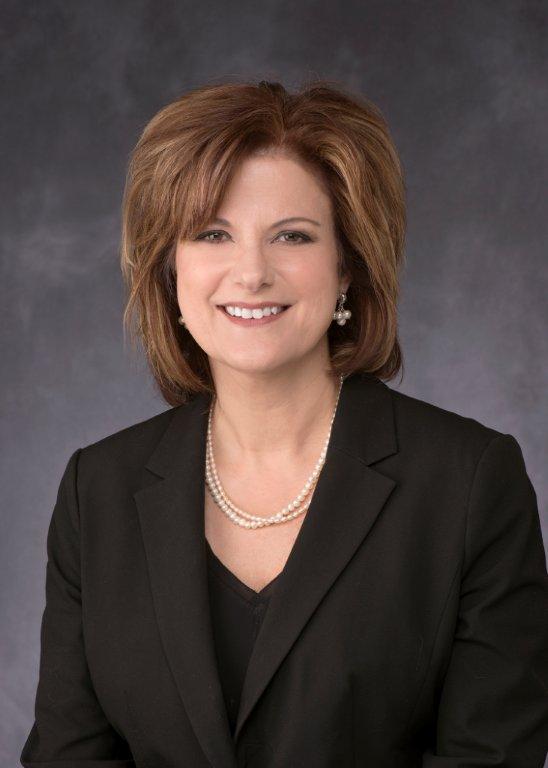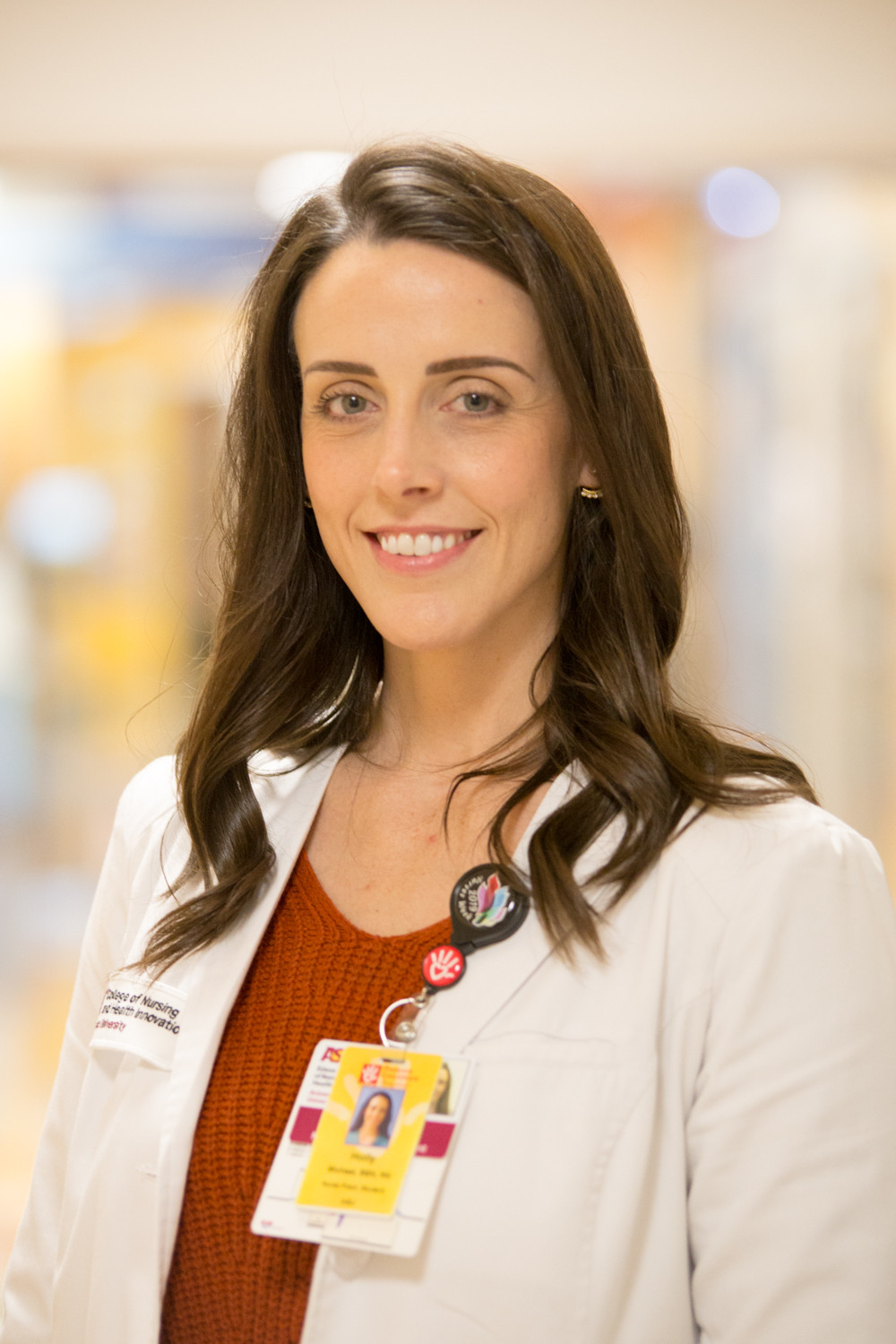ASU, Phoenix Children’s Hospital team up for pediatric-focused acute care program

Edson College Acute Care Pediatric DNP student Holly Michael reviews a chart with Iris Marku, PNP-AC, her DNP preceptor, at Phoenix Children's Hospital.
Editor’s note: This is the second Q&A in a two-part series about how ASU's Edson College of Nursing and Health Innovation and Phoenix Children's Hospital are working together to prepare students for a career in pediatric nursing and to address a looming shortfall of nurses in Arizona and across the U.S.
It’s been an exciting year for Arizona State University’s Edson College of Nursing and Health Innovation and Phoenix Children’s Hospital as the two innovative organizations have expanded their partnership. Through this collaboration, they’ve been able to create opportunities to enhance the student experience in the field of pediatrics and develop some solid programs to address a looming nurse shortage, notably in specialty areas.
Holly Michael was among the first students to enroll in the Acute Care Pediatric Nurse Practitioner Doctor of Nursing Practice (DNP) and certificate program for graduate-level nursing students after it launched last fall.
“I was already working in the pediatric intensive care unit at Phoenix Children’s when I heard about this program. I have a huge passion for working with acutely ill children, so it sparked my interest,” she said.
To get a better idea of what the Acute Care Pediatric DNP is all about and how students identify this pathway, ASU Now spoke with Michael as well as Judy Karshmer, dean of Edson College, and Julie Bowman, chief nursing officer at Phoenix Children’s Hospital.
Question: First, can you explain the various levels of training and areas of scope for nurse practitioners?
Julie Bowman: This is an important question, from a legal perspective, because many students don’t realize there are several different nurse practitioner tracks, and there’s not much crossover between them. To ensure they end up in the right Advance Practice Nursing program, students should determine the area in which they want to work. Their options are many, but for purposes of this article and pediatrics, their options are Family Nurse Practitioner, Pediatric Nurse Practitioner, or Pediatric Nurse Practitioner-Acute Care, and by scope of practice, legally different. For example, a Family Nurse Practitioner provides for a wide array of common illnesses and injuries, with ongoing, family-centered primary care to adults and children who are medically stable. A nurse who earns the Acute Care Pediatric DNP will be trained specifically for children with acute — or, more severe or sudden — medical needs, but that training won’t translate to adults.
Judy Karshmer: Pediatric Nurse Practitioners first evolved in a primary care setting, but over time, they began to seek out specialized training to handle more complex problems and treatment intervention. Acute Care DNP programs began popping up, but they were geared toward adult care. Our partnership with Phoenix Children’s is designed expressly for students who want to work with children who have acute care needs.
We expect the role of the NP to continue to evolve as patients’ needs shift and the health care provider landscape changes. Because enrollment in medical schools is not keeping pace with demands, the shortfall of general practice physicians is looming. We expect the NP to take on a larger role in the provider model and anticipate more Doctor of Nursing Practice degree programs in specialty areas. It’s an especially attractive option in Arizona, because the Arizona State Board of Nursing allows nurse practitioners to practice independently.
Dean Judy Karshmer
Q: What does the Acute Care Pediatric DNP program entail?
Karshmer: The curriculum focuses on creating a framework for developmentally supportive, family-centered, culturally-appropriate advanced-practice nursing. It is intended to prepare students upon graduation to care for infants and children with unstable chronic, complex, acute and life-threatening illnesses.
In addition to DNP-level coursework and clinical hours, students in this program complete a major intervention project in their third year of study. They identify an issue in patient care, conduct ongoing research and implement a solution within a department. Their insights and research are integrated into Phoenix Children’s care model.
This program also provides students an opportunity to learn nurse management and improve pediatric care on a broader scale in one of America’s fastest-growing cities.
Q: How did this idea of creating an Acute Care Pediatric DNP degree first come about?
Karshmer: The program is a direct response to a community need. A partnership between our college and a world-class health system is exactly how you advance education for our students, improve care for patients and boost the cachet of both institutions. We are able to make this work by having an equal, focused investment in our state’s future nurses.
In addition to the Acute Care Pediatric DNP curriculum, ASU and Phoenix Children’s worked together to launch a Dedicated Education Unit program that gives undergraduate nursing students additional time at the patient bedside and ensures they’re workforce-ready.
Bowman: For Phoenix Children’s, there were two primary reasons to launch this program. Three years ago, we began working with a consultant to help us refine our care delivery approach and ensure we were maximizing the skills of our nurse practitioners to top of license. Like many other health systems, we were faced with a highly diverse pediatric patient population and long wait times in some of our specialized service areas. Today, our NPs practice more at the top of their license. They are able to see their own patients and formulate individualized care plans within the area covered by their education, ongoing training and legal scope of practice.
As part of earning their degree, Acute Care Pediatric DNP students conduct a research project for a certain area of the health system and implement clinical or operational improvements as a direct result of their research. Their knowledge and capability enhance our patients’ access to high-quality, cost-effective care with overwhelmingly positive outcomes.
Our second reason for launching this new degree was the opportunity to partner with ASU. With their entrepreneurial culture and the strong reputation of Edson College, we knew ASU was the best choice for expanding nursing education here in Arizona.
Q: Can you describe the need for this type of nursing specialty education here in Arizona?
Karshmer: It’s impossible to overstate our need for specialty nursing education. Phoenix is one of the fastest-growing cities in the country. Our pediatric population is flourishing, as are the medical needs of Arizona’s kids. And at the same time, we’re facing a nationwide shortage of nurses and nurse practitioners.
Julie Bowman
Bowman: In planning for the future, Phoenix Children’s knew we would need more advanced practice providers in trauma, the emergency department and critical care. This program helps fill that pipeline with expertly trained clinicians who can provide this care.
This program is also a response to our growth in the East Valley, an area of the Valley that has seen extreme growth, especially in young families. Students currently in the program are in their second of three years of study, and will earn their Acute Care Pediatric DNP degrees next year when Phoenix Children’s opens its hospital at Mercy Gilbert.
Karshmer: The program also helps address health care costs. The ideal provider model for acutely ill patients includes a mix of physician specialists and NPs. Surgeons can focus on surgery while NPs handle postoperative care. It’s a perfect and more cost-effective balance of their skills.
Over time, the goal is for more pediatric nurses to pursue their NP degree to ensure the right balance of expertise.
Q: What can students look forward to with this program?
Karshmer: It’s the only program of its kind in the Southwest — perhaps in the nation. Students are trained by expert instructors in a top nursing school, Edson College and gain clinical experience at a top hospital, Phoenix Children’s. And through their intervention project, they will make a real difference for kids in their care.
Bowman: Students are immersed in evidence-based practice and get hands-on training while identifying and solving problems, conducting their own research projects and taking that research from bench to bedside. They’re in the driver’s seat in advancing patient care. There is a sense of excellence with the program at ASU.
Q: As a DNP nursing student who was early to join this program, why did you decide to pursue this specialty?
Holly Michael: I was working as a clinical nurse in the Pediatric Intensive Care Unit at Phoenix Children's Hospital when I heard about this opportunity. My heart is in pediatrics, and more specifically acutely ill children, so it appealed to me.
The program had the unique potential to help me meet my career goals and stay in Arizona. I would have the option to meet with professors in person, attend immersions and have procedure days in the lab. Beyond all this, I have a special connection with ASU — I received my undergraduate degree there. With two very reputable institutions partnering together, I felt confident in my decision. Once the application process opened, I applied and began just a few weeks later. I am currently in my second year of the program.
Holly Michael
Q: Can you share what you like about the program and courses you have taken so far?
Michael: I enjoy many different portions of the program. I took a great physiology course last fall which set a strong foundation and helped me gain a greater knowledge of the physiologic processes of the body. The acute care didactic courses and the acute care clinical course are also ones I particularly appreciated, along with a leadership course I took last fall. They gave me an improved sense of direction in this field, and the ability to present myself as a leader among clinical teams. As a result, I have leadership techniques to put into action as an advanced practice registered nurse — someone who must give strategic direction, deliver solutions and devise plans.
Q: Are you looking forward to the DNP project?
Michael: Every DNP program requires students to complete fieldwork in an area of interest and identify a problem, issue or gap in that area. Following identification, the DNP student works closely with stakeholders, providers and other staff to develop a project design and an evidence-based plan. The last steps are to implement, evaluate and disseminate the results.
The project is a major portion of our last half of the program. It’s easy to feel overwhelmed undertaking an effort like this. Luckily, ASU offers abundant support, and with that, I am excited about this portion of the curriculum. From my understanding, there are few schools offering this level of resources for DNP students.
I began the initial stages of the DNP project this fall. As of now, I am interested in working closely with the neurocritical care team, observing pediatric traumatic brain injury management. This project is very important, not only to DNP students but to the clinical department and its patient community.
Q: What are your plans once you complete your program?
Michael: Once I graduate and pass my board exam, I would love to work in and be a part of the pediatric intensive care unit, neurocritical care or trauma. I am in the beginning stages of my clinical experience in acute care, so I will continue to keep an open mind on all of the possible opportunities ahead.
More Health and medicine

New study seeks to combat national kidney shortage, improve availability for organ transplants
Chronic kidney disease affects one in seven adults in the United States. For two in 1,000 Americans, this disease will…

New initiative aims to make nursing degrees more accessible
Isabella Koklys is graduating in December, so she won’t be one of the students using the Edson College of Nursing and Health…

Reducing waste in medical settings
Health care saves lives, but at what cost? Current health care practices might be creating a large carbon footprint,…




